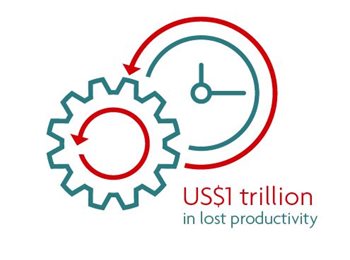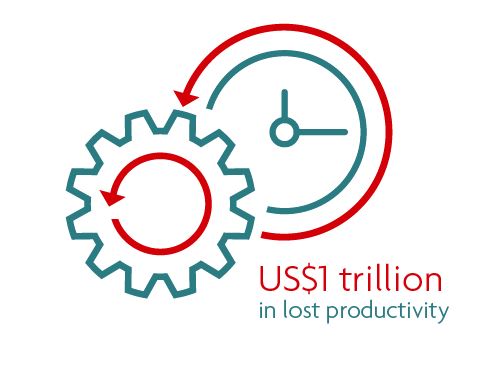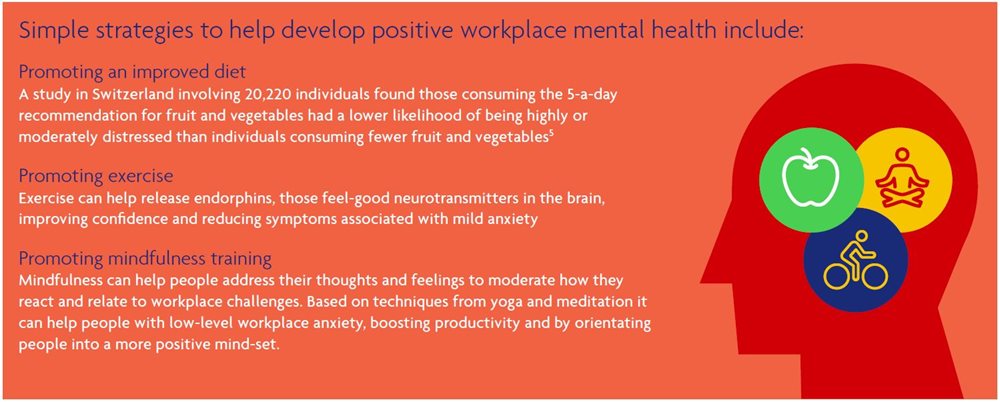Mental health problems: how can global corporates tackle this invisible epidemic?
NEWS
Monday 9 April 2018
Social commentators often talk, in a less than positive manner, about the perceived inability of millennials to cope with the rigours of the workplace. By doing so they are, probably without realising, raising a very genuine issue and one that by no means affects only this age group of workers. Workplace mental health issues, exacerbated by stress and an “always on” culture, are costing organisations globally billions a year in lost productivity, sick pay and compensation.
 To give the issue a financial context: the World Health Organisation1 (WHO) led a global study which estimated the cost of depression and anxiety disorders to the global economy is US$ 1 trillion each year in lost productivity. In the United States, as reported by The National Institute of Mental Health, major mental illness costs at least US$193 billion each year in lost earnings by sufferers2. In the United Kingdom (UK), a Group Income Protection Insurer reported mental health conditions accounted for 19% of long-term absence claims3. The financial cost of psychological disorders is being increasingly studied and highlighted by organisations across the globe.
To give the issue a financial context: the World Health Organisation1 (WHO) led a global study which estimated the cost of depression and anxiety disorders to the global economy is US$ 1 trillion each year in lost productivity. In the United States, as reported by The National Institute of Mental Health, major mental illness costs at least US$193 billion each year in lost earnings by sufferers2. In the United Kingdom (UK), a Group Income Protection Insurer reported mental health conditions accounted for 19% of long-term absence claims3. The financial cost of psychological disorders is being increasingly studied and highlighted by organisations across the globe.

Don’t forget, we’re all vulnerable
It’s important to remember that mental health issues can affect employees at any level in an organisation, on any salary package and in any industry. In the UK, the chief executive of Lloyds Bank admitted that the job nearly “broke” him as the firm’s precarious finances drove him into a “zombified state”. He spent nine days at the Priory clinic triggered by a period of prolonged insomnia.
Some commentators felt that his senior position and a financial package to match meant that he should have been able to cope, simply highlighting the lack of understanding about mental illness and saying something about human compassion. It is unlikely that these commentators would have reacted in the same way if he had been suffering from a physical ailment, which further serves to emphasise why we need far more education and tolerance in the area of mental health.
Leading sports stars, with seemingly wonderful lives, can struggle after years of operating in high-pressure environments. NBA stars such as DeMar Rozan of the Toronto Raptors and Kevin Love of the Cleveland Cavaliers, have talked of suffering from depression and even on-court panic attacks. Mental health issues can affect anyone at any time, which is why it is so important for organisations to have rigorous processes that can monitor and support the psychological wellbeing of employees.
‘It is unlikely that these commentators would have reacted in the same way if he had been suffering from a physical ailment… highlighting the lack of understanding about mental illness…’
The importance of improving mental health in the workplace
There is a clear business case for investing in preventative programmes that actively address the psychological wellbeing of employees and reactive strategies to support those suffering from mental illness. If disorders aren’t tackled, it can lead to individuals displaying aggravated behaviours including violence; increased risks of workplace accidents that can result in compensation claims; elevated risk of poor advice being offering that can result in public liability claims against a business; productivity loss; and cost of absence management along with other issues.
Traditional models of sickness absence measurement are often insufficient when addressing mental illness as they tend to be too focussed on physical wellbeing rather than psychological issues. In addition, many people fear disclosing mental illness as a reason for being off work. It makes good financial sense to ensure mental health employee benefits are not only available to employees, but also known to be so.
‘“Stress” has become a catch-all term, describing everything…’
But just how easy is this?
One of the biggest issues when tackling mental illness in the workplace is the perceived stigma around the various conditions. Studies all over the world have consistently shown that those with mental health issues tend to be treated differently by colleagues, often given work that is less meaningful and excluded from key business decisions. We all understand that with physical ailments there is a likely prognosis or timescale for treatment. Mental illness is more difficult to put into such neat parameters.
The language and terminology related to psychological issues can also be problematic. “Stress” has become a catch-all term, describing everything from short-term mild nervousness about meeting a deadline to a debilitating long-term condition that can require medical treatment and sustained counselling.
And while long-term heightened levels of cortisol, generated by stress, can result in an increase in blood pressure levels and even a decrease in libido, it is important to recognise that, in small doses, stress can be a good thing. The release of hormones such as adrenaline, cortisol and norepinephrine can help people channel their focus and react quickly to changing situations. What this means for managers and firms is they need robust processes in place to monitor stress levels and recognise when it stops being ‘positive’. Employers must then provide opportunities for employees to self-refer for additional support or actively intervene if required.
How can businesses develop strategies to help employees cope?
The first thing to think about when addressing workplace mental health is identifying if there is an existing problem. This needs to involve a combination of organisational data collated usually by HR, including statistics on sickness absence, employee satisfaction/engagement surveys, time keeping, productivity, and workplace injuries. In addition, regular health checks should extend beyond physical examinations to include psychological screening.
Employers can also utilise smart apps that support employees by monitoring stress levels and triggers, while helping them develop mental resilience and improved sleep. These apps can also provide anonymised data on employee stress levels to employers, which they can break down by department or geographic area to help identify pressure points.

‘ … just four hours of training given to managers significantly reduced sick leave taken by their employees.’
In some cases, employees directly affected by stress and mental illness may not wish to make it known in their work environment, or may experience symptoms associated with mental illness but not be prepared to seek or accept medical diagnosis. The thing is – it can’t be ignored and this is why training on identification and offering peer support is so important. Employees need to be trained on how to identify potential symptoms of mental health problems with colleagues and how to sensitively prompt them towards support or interventions.
Warning signs of mental health issues in the workplace include anxiety, employees complaining of insomnia, drop in productivity, employees becoming more reclusive and high rates of absenteeism. According to one study published last year4, managers can have a significant impact on an employee’s mental health and just four hours of training given to managers significantly reduced sick leave taken by their employees.
While these techniques may help tackle mild anxiety and stress, workplaces also need strategies and solutions to address more complex psychological problems. Many people find talking therapies helpful for mental health problems such as depression, anxiety and stress and evidence confirms that opening up through therapies such as cognitive behavioural therapy (CBT) can be effective in helping address some mental health issues. Indeed, the UK’s The National Institute for Health and Care Excellence has approved the use of computerised cognitive behavioural therapy (CCBT) for the treatment of depression, generalised anxiety disorders and panic disorder6.
Employers may find providing access to CCBT solutions especially effective as they are confidential meaning staff can access support via tablets and smartphones discreetly and remotely from their work environment. Research suggests this can be equally as effective as having face-to-face therapy with a therapist.
On the whole, corporate wellness programmes need to evolve to be fit for purpose regarding the treatment of mental health disorders. Benefits packages often focus purely on offering physical benefits, such as subsidised gym membership, but may not include counselling sessions or training on stress management and resilience.
Thinking long-term
As well as the social and economic challenges that may be driving up rates of mental illness in the workplace, an aging workforce could see employers increasingly needing to monitor for signs of dementia amongst employees in the long-term. For corporates, income protection and health insurers, mental illness represents a significant risk and threat to profitability with business often left carrying the cost of all the issues that are leading to an increase in mental illness.
Insurers particularly may be forced to increase premiums or increase exclusions if they are to remain profitable. Given that in developed economies such as the UK, for every £178 currently spent on cancer research, only £8 is invested per affected person in researching the causes of mental illness7, long-term solutions are likely to be some way off. It is therefore crucial companies do all they can to monitor and support their employees’ mental health and invest in proactive early interventions for those who may be suffering.
1 http://www.who.int/mental_health/in_the_workplace/en/
2 https://www.nimh.nih.gov/news/science-news/2008/mental-disorders-cost-society-billions-in-unearned-income.shtml
3 https://www.personneltoday.com/hr/cancer-is-top-cause-of-long-term-sickness-absence-claims-report-shows/#
4 https://www.reuters.com/article/us-health-workplace-mental-health/workplace-mental-health-training-could-cut-sick-leave-costs-idUSKBN1D82KS
5 https://www.ncbi.nlm.nih.gov/pmc/articles/PMC4590213/
6 https://www.nice.org.uk/guidance/ta97
7 https://www.mqmentalhealth.org/posts/funding-gap-in-mental-health-research-leaving-generations-of-young-people-in-the-dark
The MAXIS Global Benefits Network (“Network”) is a network of locally licensed MAXIS member insurance companies (“Members”) founded by AXA France Vie, Paris, France (AXA) and Metropolitan Life Insurance Company, New York, NY (MLIC). MAXIS GBN, registered with ORIAS under number 16000513, and with its registered office at 313, Terrasses de l’Arche – 92 727 Nanterre Cedex, France, is an insurance and reinsurance intermediary that promotes the Network. MAXIS GBN is jointly owned by affiliates of AXA and MLIC and does not issue policies or provide insurance; such activities are carried out by the Members. MAXIS GBN operates in the UK through UK establishment with its registered address at 1st Floor, The Monument Building, 11 Monument Street, London EC3R 8AF, Establishment Number BR018216 and in other European countries on a services basis. MAXIS GBN operates in the U.S. through MetLife Insurance Brokerage, Inc., with its address at 1095 Avenue of the Americas, NY, NY, 10036, a NY licensed insurance broker. MLIC is the only Member licensed to transact insurance business in NY. The other Members are not licensed or authorised to do business in NY and the policies and contracts they issue have not been approved by the NY Superintendent of Financial Services, are not protected by the NY state guaranty fund, and are not subject to all of the laws of NY. MAR00211 / 0418